Fodare Pty Ltd v Shearn [2011] NSWSC 479: Director Duty Case Analysis
VerifiedAdded on 2021/06/17
|11
|2609
|43
Case Study
AI Summary
This case study examines the Fodare Pty Ltd v Shearn [2011] NSWSC 479 case, focusing on the breaches of director duties by Shearn, the sole director of Fodare Pty Ltd. The analysis covers the facts of the case, including Shearn's diversion of company funds and the subsequent liquidation. It details the specific duties breached under the Corporations Act 2001 (Cth), including the duty of care and diligence (section 180(1)), the duty to act in good faith (section 181(1)), and the proper use of position (section 182(1)). The court's decision, which found Shearn liable for breaching these duties, is discussed, along with the relevance and impact of the case on director responsibilities, especially for sole directors. The case highlights the importance of maintaining proper company records and prioritizing the company's interests over personal gain. The analysis also touches upon the business judgment rule and the court's emphasis on the director's knowledge and the purpose behind the transactions. The case underscores the serious consequences of breaching director duties under both common law and statutory provisions.
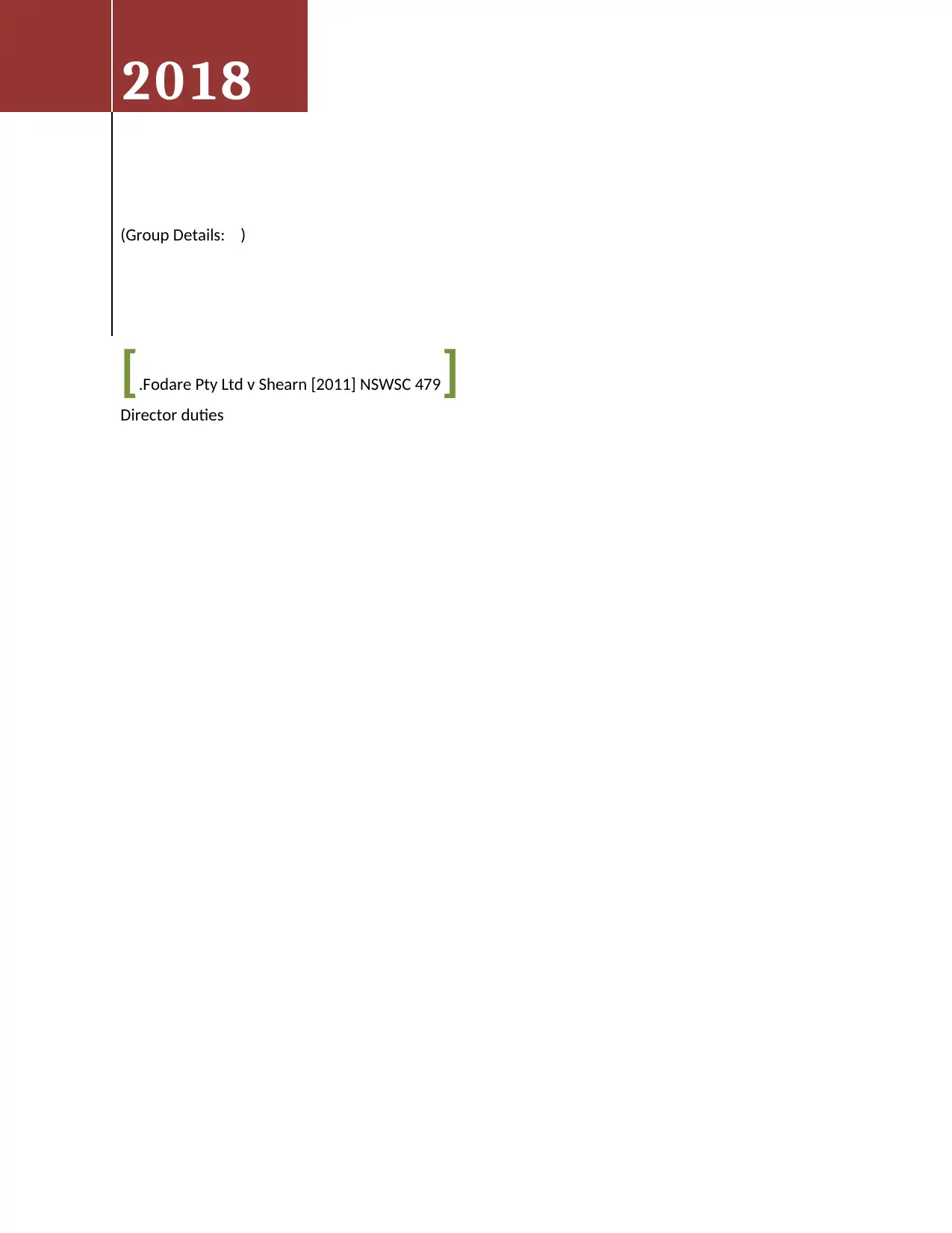
[.Fodare Pty Ltd v Shearn [2011] NSWSC 479]
Director duties
2018
(Group Details: )
Director duties
2018
(Group Details: )
Paraphrase This Document
Need a fresh take? Get an instant paraphrase of this document with our AI Paraphraser
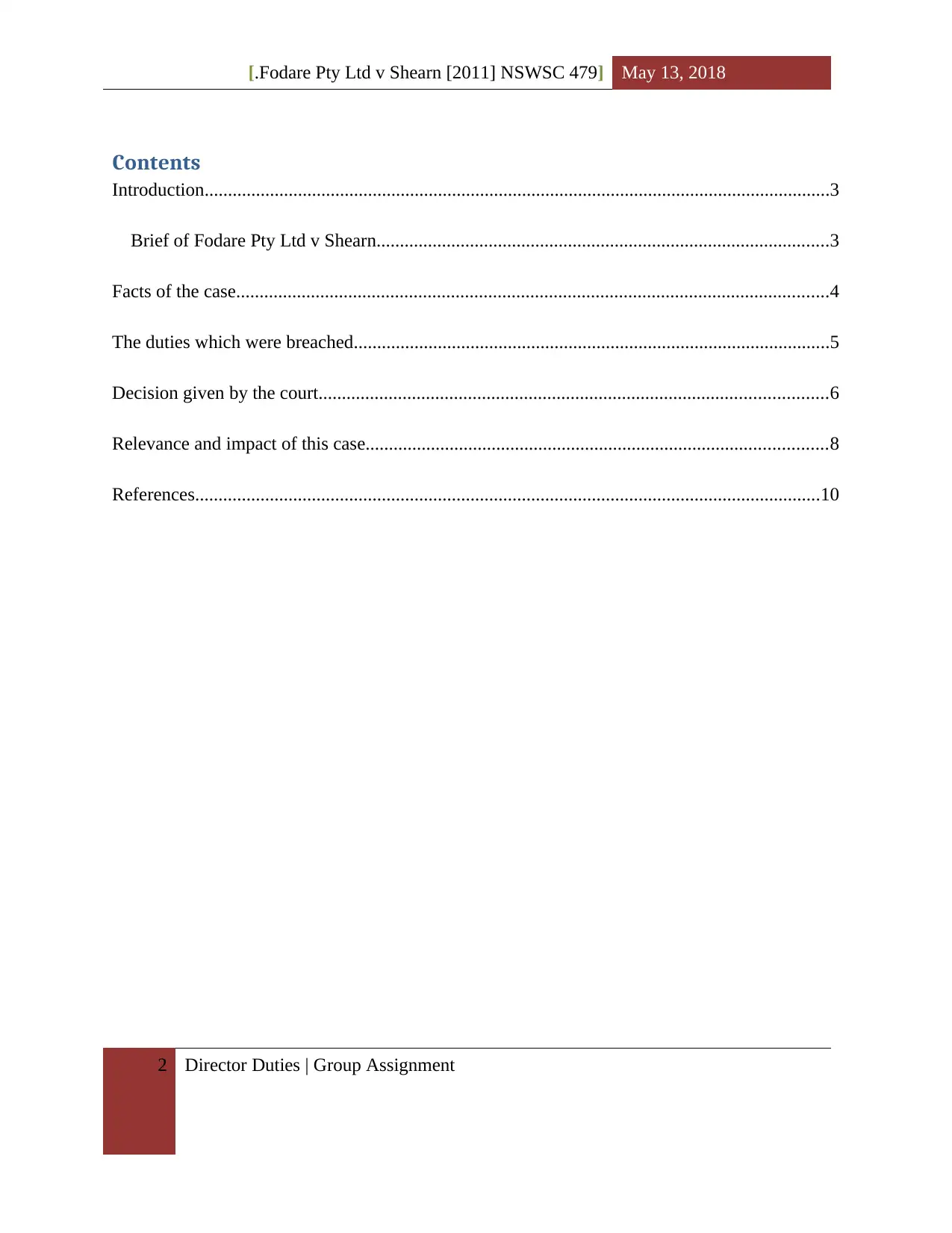
[.Fodare Pty Ltd v Shearn [2011] NSWSC 479] May 13, 2018
Contents
Introduction......................................................................................................................................3
Brief of Fodare Pty Ltd v Shearn.................................................................................................3
Facts of the case...............................................................................................................................4
The duties which were breached......................................................................................................5
Decision given by the court.............................................................................................................6
Relevance and impact of this case...................................................................................................8
References......................................................................................................................................10
2 Director Duties | Group Assignment
Contents
Introduction......................................................................................................................................3
Brief of Fodare Pty Ltd v Shearn.................................................................................................3
Facts of the case...............................................................................................................................4
The duties which were breached......................................................................................................5
Decision given by the court.............................................................................................................6
Relevance and impact of this case...................................................................................................8
References......................................................................................................................................10
2 Director Duties | Group Assignment
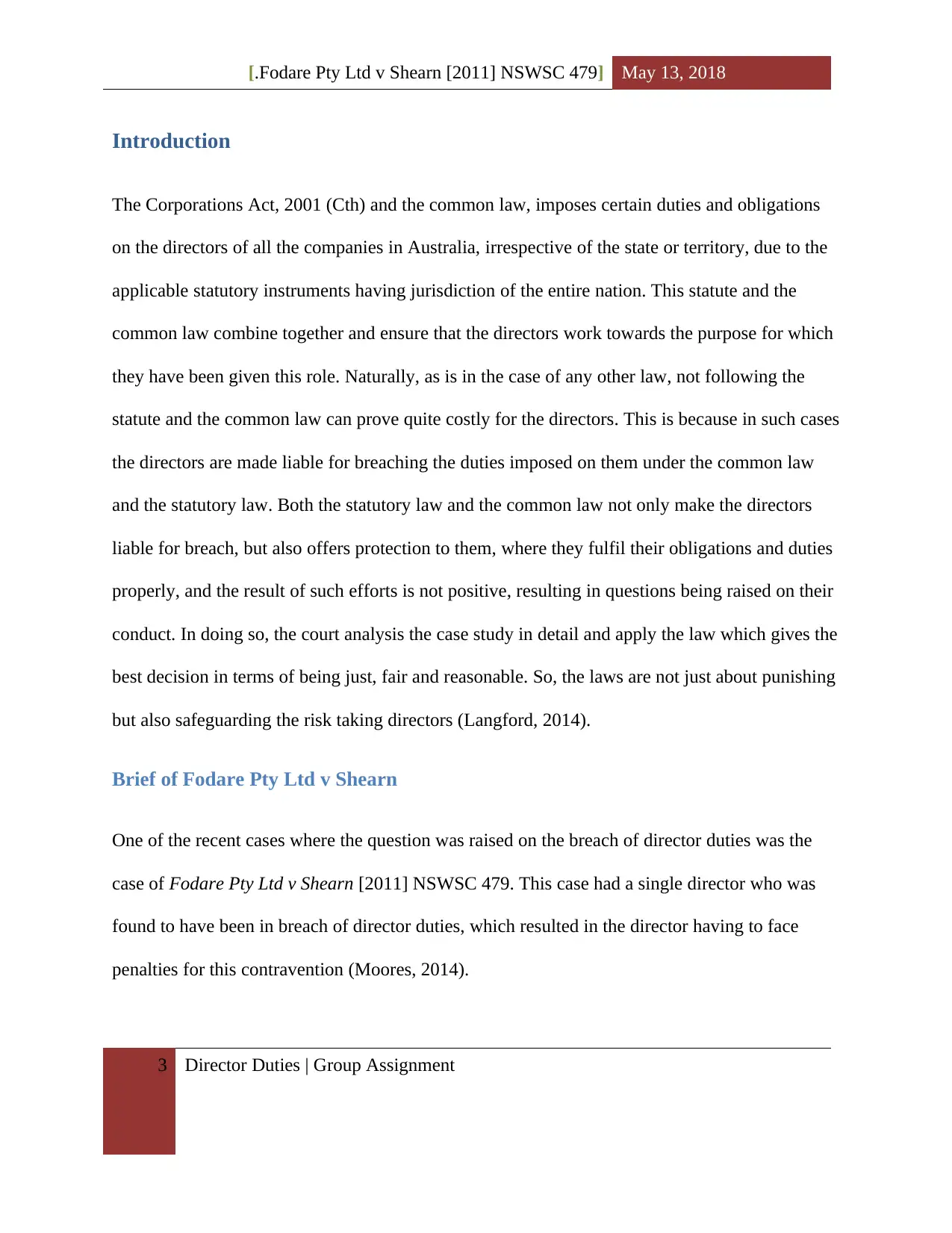
[.Fodare Pty Ltd v Shearn [2011] NSWSC 479] May 13, 2018
Introduction
The Corporations Act, 2001 (Cth) and the common law, imposes certain duties and obligations
on the directors of all the companies in Australia, irrespective of the state or territory, due to the
applicable statutory instruments having jurisdiction of the entire nation. This statute and the
common law combine together and ensure that the directors work towards the purpose for which
they have been given this role. Naturally, as is in the case of any other law, not following the
statute and the common law can prove quite costly for the directors. This is because in such cases
the directors are made liable for breaching the duties imposed on them under the common law
and the statutory law. Both the statutory law and the common law not only make the directors
liable for breach, but also offers protection to them, where they fulfil their obligations and duties
properly, and the result of such efforts is not positive, resulting in questions being raised on their
conduct. In doing so, the court analysis the case study in detail and apply the law which gives the
best decision in terms of being just, fair and reasonable. So, the laws are not just about punishing
but also safeguarding the risk taking directors (Langford, 2014).
Brief of Fodare Pty Ltd v Shearn
One of the recent cases where the question was raised on the breach of director duties was the
case of Fodare Pty Ltd v Shearn [2011] NSWSC 479. This case had a single director who was
found to have been in breach of director duties, which resulted in the director having to face
penalties for this contravention (Moores, 2014).
3 Director Duties | Group Assignment
Introduction
The Corporations Act, 2001 (Cth) and the common law, imposes certain duties and obligations
on the directors of all the companies in Australia, irrespective of the state or territory, due to the
applicable statutory instruments having jurisdiction of the entire nation. This statute and the
common law combine together and ensure that the directors work towards the purpose for which
they have been given this role. Naturally, as is in the case of any other law, not following the
statute and the common law can prove quite costly for the directors. This is because in such cases
the directors are made liable for breaching the duties imposed on them under the common law
and the statutory law. Both the statutory law and the common law not only make the directors
liable for breach, but also offers protection to them, where they fulfil their obligations and duties
properly, and the result of such efforts is not positive, resulting in questions being raised on their
conduct. In doing so, the court analysis the case study in detail and apply the law which gives the
best decision in terms of being just, fair and reasonable. So, the laws are not just about punishing
but also safeguarding the risk taking directors (Langford, 2014).
Brief of Fodare Pty Ltd v Shearn
One of the recent cases where the question was raised on the breach of director duties was the
case of Fodare Pty Ltd v Shearn [2011] NSWSC 479. This case had a single director who was
found to have been in breach of director duties, which resulted in the director having to face
penalties for this contravention (Moores, 2014).
3 Director Duties | Group Assignment
⊘ This is a preview!⊘
Do you want full access?
Subscribe today to unlock all pages.

Trusted by 1+ million students worldwide
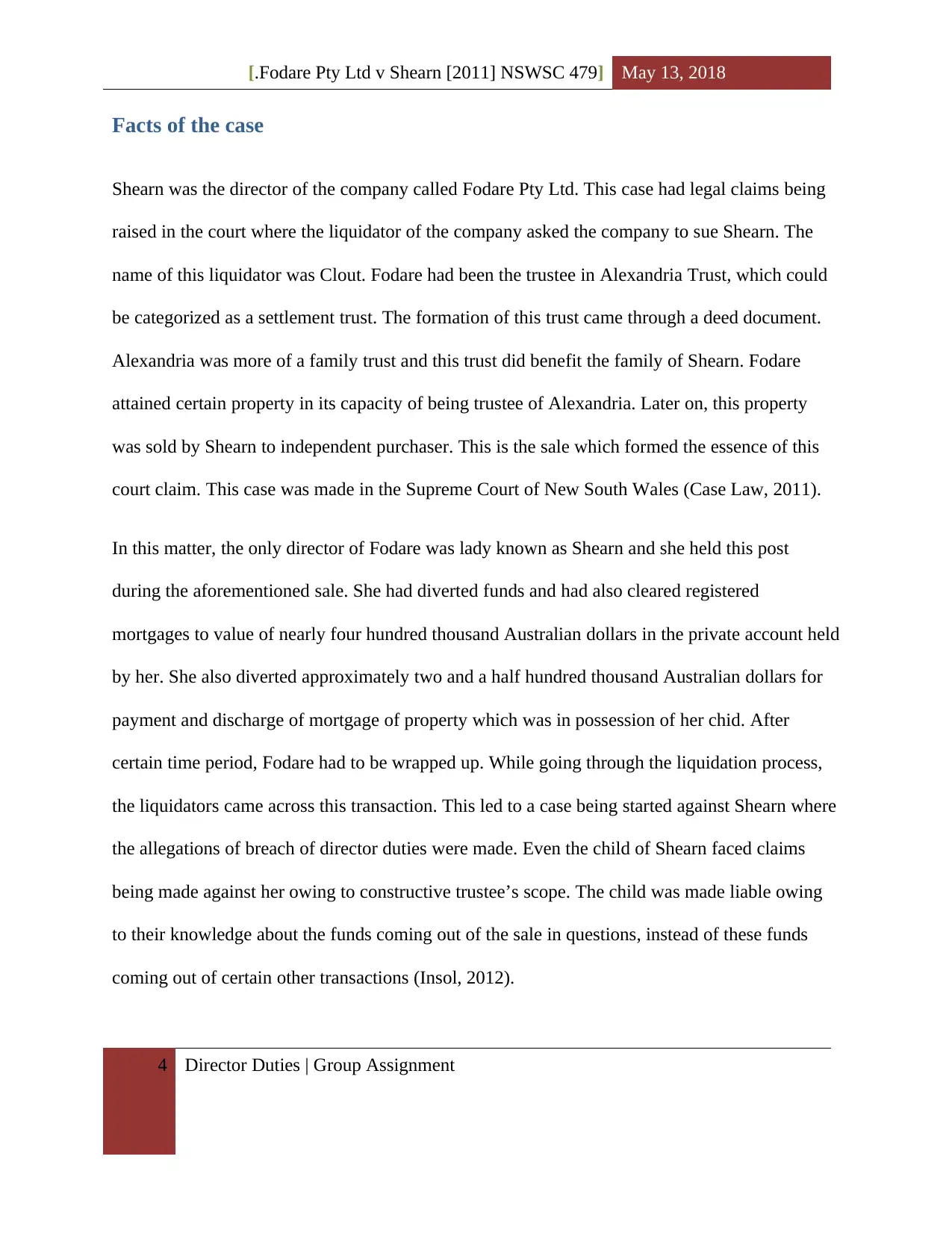
[.Fodare Pty Ltd v Shearn [2011] NSWSC 479] May 13, 2018
Facts of the case
Shearn was the director of the company called Fodare Pty Ltd. This case had legal claims being
raised in the court where the liquidator of the company asked the company to sue Shearn. The
name of this liquidator was Clout. Fodare had been the trustee in Alexandria Trust, which could
be categorized as a settlement trust. The formation of this trust came through a deed document.
Alexandria was more of a family trust and this trust did benefit the family of Shearn. Fodare
attained certain property in its capacity of being trustee of Alexandria. Later on, this property
was sold by Shearn to independent purchaser. This is the sale which formed the essence of this
court claim. This case was made in the Supreme Court of New South Wales (Case Law, 2011).
In this matter, the only director of Fodare was lady known as Shearn and she held this post
during the aforementioned sale. She had diverted funds and had also cleared registered
mortgages to value of nearly four hundred thousand Australian dollars in the private account held
by her. She also diverted approximately two and a half hundred thousand Australian dollars for
payment and discharge of mortgage of property which was in possession of her chid. After
certain time period, Fodare had to be wrapped up. While going through the liquidation process,
the liquidators came across this transaction. This led to a case being started against Shearn where
the allegations of breach of director duties were made. Even the child of Shearn faced claims
being made against her owing to constructive trustee’s scope. The child was made liable owing
to their knowledge about the funds coming out of the sale in questions, instead of these funds
coming out of certain other transactions (Insol, 2012).
4 Director Duties | Group Assignment
Facts of the case
Shearn was the director of the company called Fodare Pty Ltd. This case had legal claims being
raised in the court where the liquidator of the company asked the company to sue Shearn. The
name of this liquidator was Clout. Fodare had been the trustee in Alexandria Trust, which could
be categorized as a settlement trust. The formation of this trust came through a deed document.
Alexandria was more of a family trust and this trust did benefit the family of Shearn. Fodare
attained certain property in its capacity of being trustee of Alexandria. Later on, this property
was sold by Shearn to independent purchaser. This is the sale which formed the essence of this
court claim. This case was made in the Supreme Court of New South Wales (Case Law, 2011).
In this matter, the only director of Fodare was lady known as Shearn and she held this post
during the aforementioned sale. She had diverted funds and had also cleared registered
mortgages to value of nearly four hundred thousand Australian dollars in the private account held
by her. She also diverted approximately two and a half hundred thousand Australian dollars for
payment and discharge of mortgage of property which was in possession of her chid. After
certain time period, Fodare had to be wrapped up. While going through the liquidation process,
the liquidators came across this transaction. This led to a case being started against Shearn where
the allegations of breach of director duties were made. Even the child of Shearn faced claims
being made against her owing to constructive trustee’s scope. The child was made liable owing
to their knowledge about the funds coming out of the sale in questions, instead of these funds
coming out of certain other transactions (Insol, 2012).
4 Director Duties | Group Assignment
Paraphrase This Document
Need a fresh take? Get an instant paraphrase of this document with our AI Paraphraser
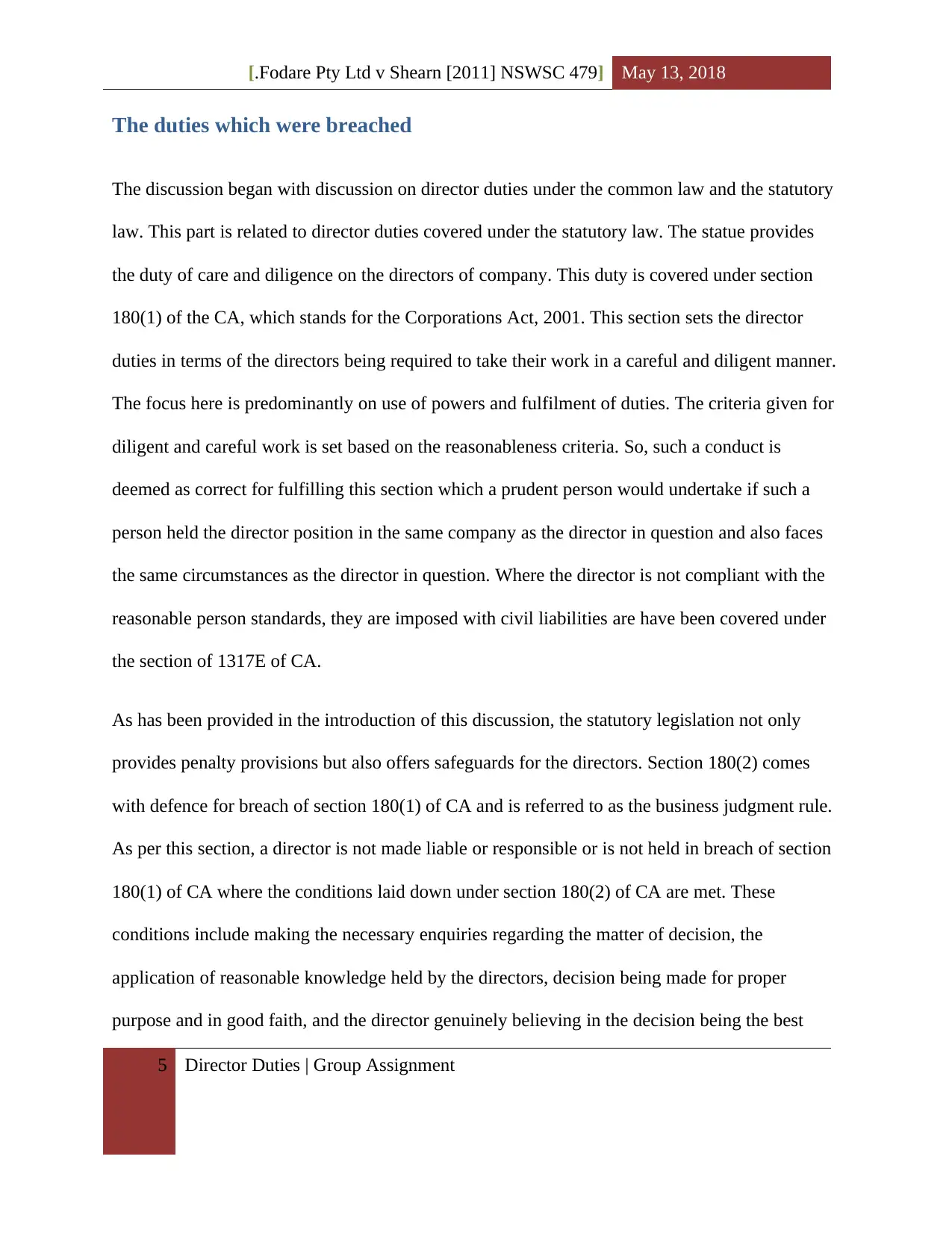
[.Fodare Pty Ltd v Shearn [2011] NSWSC 479] May 13, 2018
The duties which were breached
The discussion began with discussion on director duties under the common law and the statutory
law. This part is related to director duties covered under the statutory law. The statue provides
the duty of care and diligence on the directors of company. This duty is covered under section
180(1) of the CA, which stands for the Corporations Act, 2001. This section sets the director
duties in terms of the directors being required to take their work in a careful and diligent manner.
The focus here is predominantly on use of powers and fulfilment of duties. The criteria given for
diligent and careful work is set based on the reasonableness criteria. So, such a conduct is
deemed as correct for fulfilling this section which a prudent person would undertake if such a
person held the director position in the same company as the director in question and also faces
the same circumstances as the director in question. Where the director is not compliant with the
reasonable person standards, they are imposed with civil liabilities are have been covered under
the section of 1317E of CA.
As has been provided in the introduction of this discussion, the statutory legislation not only
provides penalty provisions but also offers safeguards for the directors. Section 180(2) comes
with defence for breach of section 180(1) of CA and is referred to as the business judgment rule.
As per this section, a director is not made liable or responsible or is not held in breach of section
180(1) of CA where the conditions laid down under section 180(2) of CA are met. These
conditions include making the necessary enquiries regarding the matter of decision, the
application of reasonable knowledge held by the directors, decision being made for proper
purpose and in good faith, and the director genuinely believing in the decision being the best
5 Director Duties | Group Assignment
The duties which were breached
The discussion began with discussion on director duties under the common law and the statutory
law. This part is related to director duties covered under the statutory law. The statue provides
the duty of care and diligence on the directors of company. This duty is covered under section
180(1) of the CA, which stands for the Corporations Act, 2001. This section sets the director
duties in terms of the directors being required to take their work in a careful and diligent manner.
The focus here is predominantly on use of powers and fulfilment of duties. The criteria given for
diligent and careful work is set based on the reasonableness criteria. So, such a conduct is
deemed as correct for fulfilling this section which a prudent person would undertake if such a
person held the director position in the same company as the director in question and also faces
the same circumstances as the director in question. Where the director is not compliant with the
reasonable person standards, they are imposed with civil liabilities are have been covered under
the section of 1317E of CA.
As has been provided in the introduction of this discussion, the statutory legislation not only
provides penalty provisions but also offers safeguards for the directors. Section 180(2) comes
with defence for breach of section 180(1) of CA and is referred to as the business judgment rule.
As per this section, a director is not made liable or responsible or is not held in breach of section
180(1) of CA where the conditions laid down under section 180(2) of CA are met. These
conditions include making the necessary enquiries regarding the matter of decision, the
application of reasonable knowledge held by the directors, decision being made for proper
purpose and in good faith, and the director genuinely believing in the decision being the best
5 Director Duties | Group Assignment
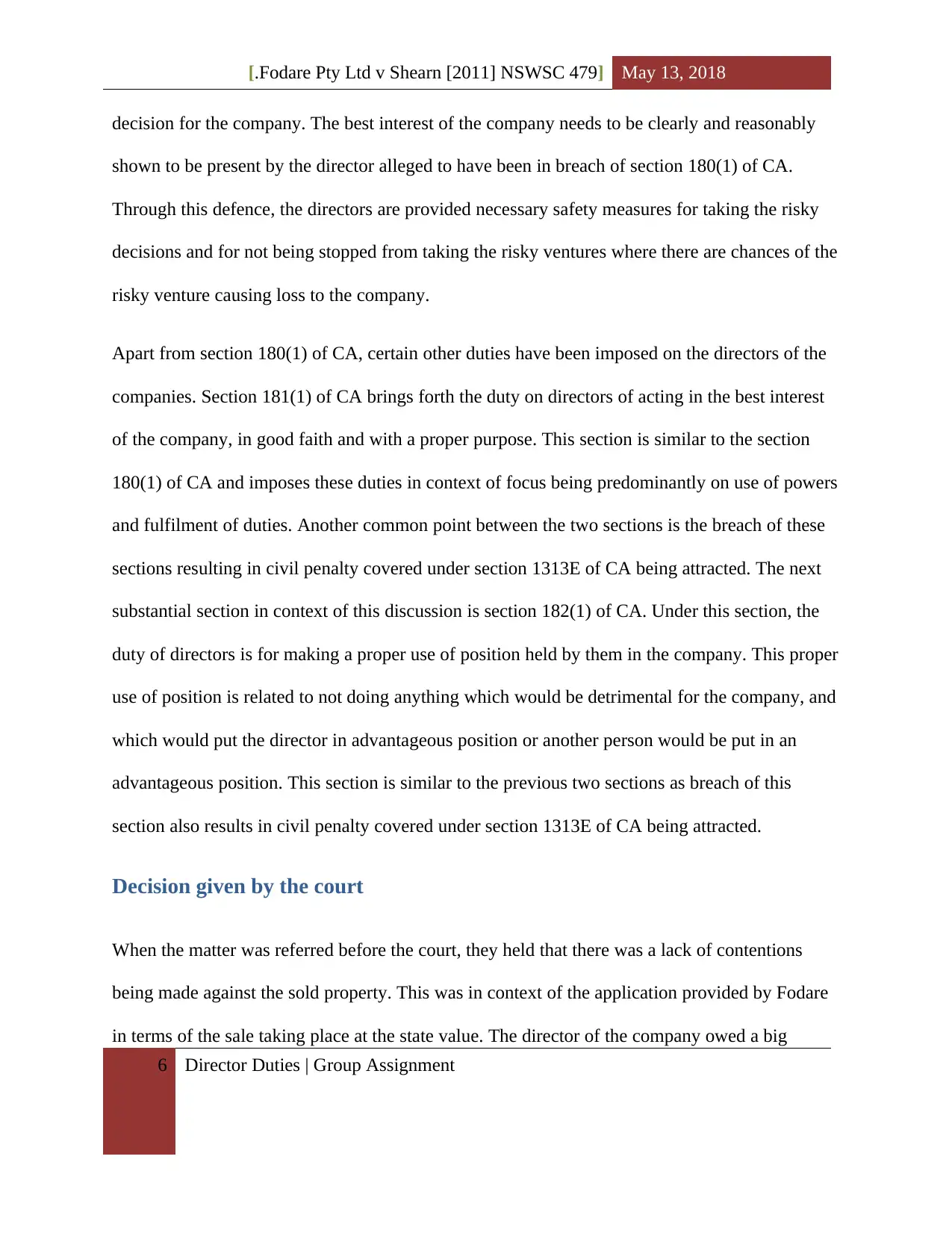
[.Fodare Pty Ltd v Shearn [2011] NSWSC 479] May 13, 2018
decision for the company. The best interest of the company needs to be clearly and reasonably
shown to be present by the director alleged to have been in breach of section 180(1) of CA.
Through this defence, the directors are provided necessary safety measures for taking the risky
decisions and for not being stopped from taking the risky ventures where there are chances of the
risky venture causing loss to the company.
Apart from section 180(1) of CA, certain other duties have been imposed on the directors of the
companies. Section 181(1) of CA brings forth the duty on directors of acting in the best interest
of the company, in good faith and with a proper purpose. This section is similar to the section
180(1) of CA and imposes these duties in context of focus being predominantly on use of powers
and fulfilment of duties. Another common point between the two sections is the breach of these
sections resulting in civil penalty covered under section 1313E of CA being attracted. The next
substantial section in context of this discussion is section 182(1) of CA. Under this section, the
duty of directors is for making a proper use of position held by them in the company. This proper
use of position is related to not doing anything which would be detrimental for the company, and
which would put the director in advantageous position or another person would be put in an
advantageous position. This section is similar to the previous two sections as breach of this
section also results in civil penalty covered under section 1313E of CA being attracted.
Decision given by the court
When the matter was referred before the court, they held that there was a lack of contentions
being made against the sold property. This was in context of the application provided by Fodare
in terms of the sale taking place at the state value. The director of the company owed a big
6 Director Duties | Group Assignment
decision for the company. The best interest of the company needs to be clearly and reasonably
shown to be present by the director alleged to have been in breach of section 180(1) of CA.
Through this defence, the directors are provided necessary safety measures for taking the risky
decisions and for not being stopped from taking the risky ventures where there are chances of the
risky venture causing loss to the company.
Apart from section 180(1) of CA, certain other duties have been imposed on the directors of the
companies. Section 181(1) of CA brings forth the duty on directors of acting in the best interest
of the company, in good faith and with a proper purpose. This section is similar to the section
180(1) of CA and imposes these duties in context of focus being predominantly on use of powers
and fulfilment of duties. Another common point between the two sections is the breach of these
sections resulting in civil penalty covered under section 1313E of CA being attracted. The next
substantial section in context of this discussion is section 182(1) of CA. Under this section, the
duty of directors is for making a proper use of position held by them in the company. This proper
use of position is related to not doing anything which would be detrimental for the company, and
which would put the director in advantageous position or another person would be put in an
advantageous position. This section is similar to the previous two sections as breach of this
section also results in civil penalty covered under section 1313E of CA being attracted.
Decision given by the court
When the matter was referred before the court, they held that there was a lack of contentions
being made against the sold property. This was in context of the application provided by Fodare
in terms of the sale taking place at the state value. The director of the company owed a big
6 Director Duties | Group Assignment
⊘ This is a preview!⊘
Do you want full access?
Subscribe today to unlock all pages.

Trusted by 1+ million students worldwide
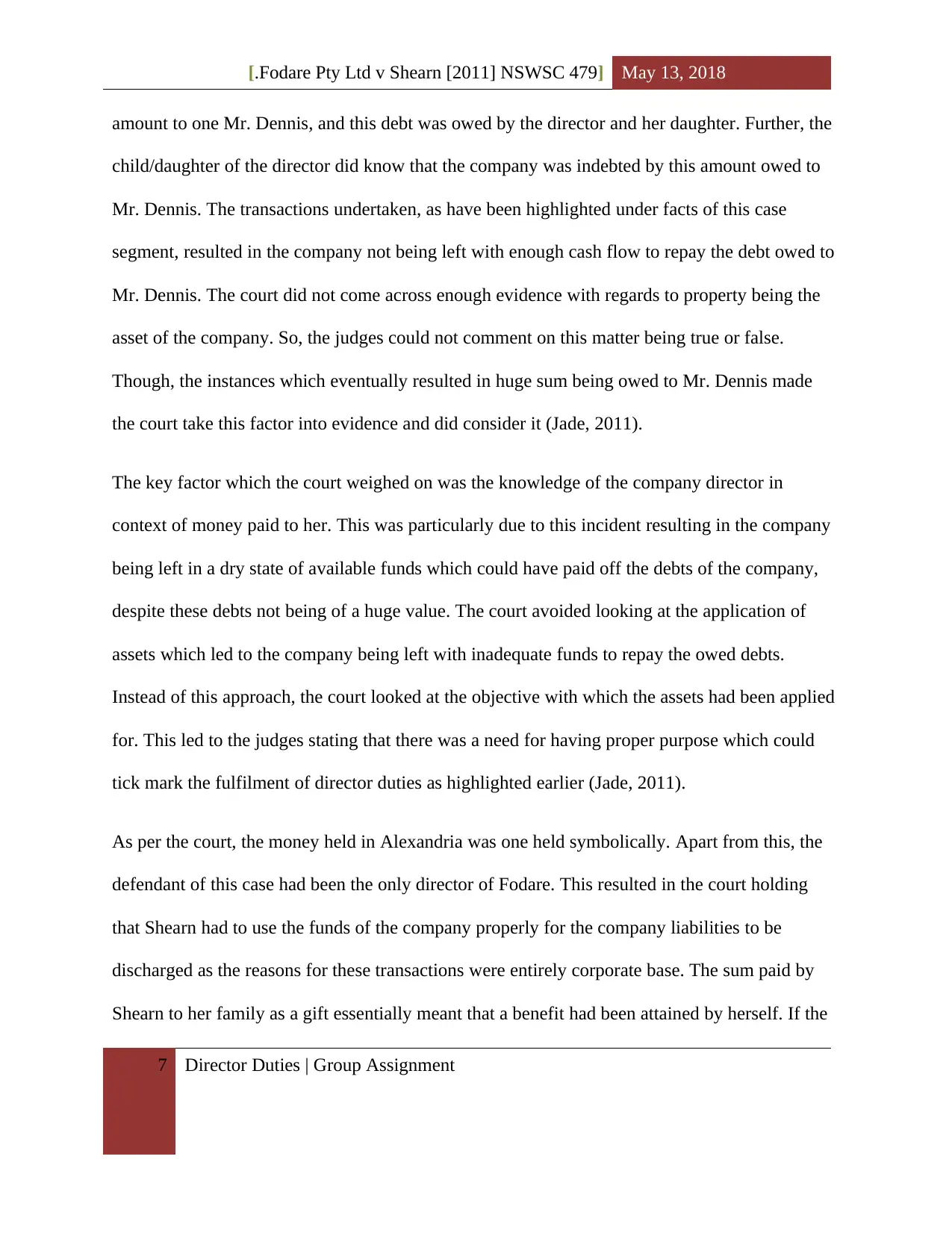
[.Fodare Pty Ltd v Shearn [2011] NSWSC 479] May 13, 2018
amount to one Mr. Dennis, and this debt was owed by the director and her daughter. Further, the
child/daughter of the director did know that the company was indebted by this amount owed to
Mr. Dennis. The transactions undertaken, as have been highlighted under facts of this case
segment, resulted in the company not being left with enough cash flow to repay the debt owed to
Mr. Dennis. The court did not come across enough evidence with regards to property being the
asset of the company. So, the judges could not comment on this matter being true or false.
Though, the instances which eventually resulted in huge sum being owed to Mr. Dennis made
the court take this factor into evidence and did consider it (Jade, 2011).
The key factor which the court weighed on was the knowledge of the company director in
context of money paid to her. This was particularly due to this incident resulting in the company
being left in a dry state of available funds which could have paid off the debts of the company,
despite these debts not being of a huge value. The court avoided looking at the application of
assets which led to the company being left with inadequate funds to repay the owed debts.
Instead of this approach, the court looked at the objective with which the assets had been applied
for. This led to the judges stating that there was a need for having proper purpose which could
tick mark the fulfilment of director duties as highlighted earlier (Jade, 2011).
As per the court, the money held in Alexandria was one held symbolically. Apart from this, the
defendant of this case had been the only director of Fodare. This resulted in the court holding
that Shearn had to use the funds of the company properly for the company liabilities to be
discharged as the reasons for these transactions were entirely corporate base. The sum paid by
Shearn to her family as a gift essentially meant that a benefit had been attained by herself. If the
7 Director Duties | Group Assignment
amount to one Mr. Dennis, and this debt was owed by the director and her daughter. Further, the
child/daughter of the director did know that the company was indebted by this amount owed to
Mr. Dennis. The transactions undertaken, as have been highlighted under facts of this case
segment, resulted in the company not being left with enough cash flow to repay the debt owed to
Mr. Dennis. The court did not come across enough evidence with regards to property being the
asset of the company. So, the judges could not comment on this matter being true or false.
Though, the instances which eventually resulted in huge sum being owed to Mr. Dennis made
the court take this factor into evidence and did consider it (Jade, 2011).
The key factor which the court weighed on was the knowledge of the company director in
context of money paid to her. This was particularly due to this incident resulting in the company
being left in a dry state of available funds which could have paid off the debts of the company,
despite these debts not being of a huge value. The court avoided looking at the application of
assets which led to the company being left with inadequate funds to repay the owed debts.
Instead of this approach, the court looked at the objective with which the assets had been applied
for. This led to the judges stating that there was a need for having proper purpose which could
tick mark the fulfilment of director duties as highlighted earlier (Jade, 2011).
As per the court, the money held in Alexandria was one held symbolically. Apart from this, the
defendant of this case had been the only director of Fodare. This resulted in the court holding
that Shearn had to use the funds of the company properly for the company liabilities to be
discharged as the reasons for these transactions were entirely corporate base. The sum paid by
Shearn to her family as a gift essentially meant that a benefit had been attained by herself. If the
7 Director Duties | Group Assignment
Paraphrase This Document
Need a fresh take? Get an instant paraphrase of this document with our AI Paraphraser
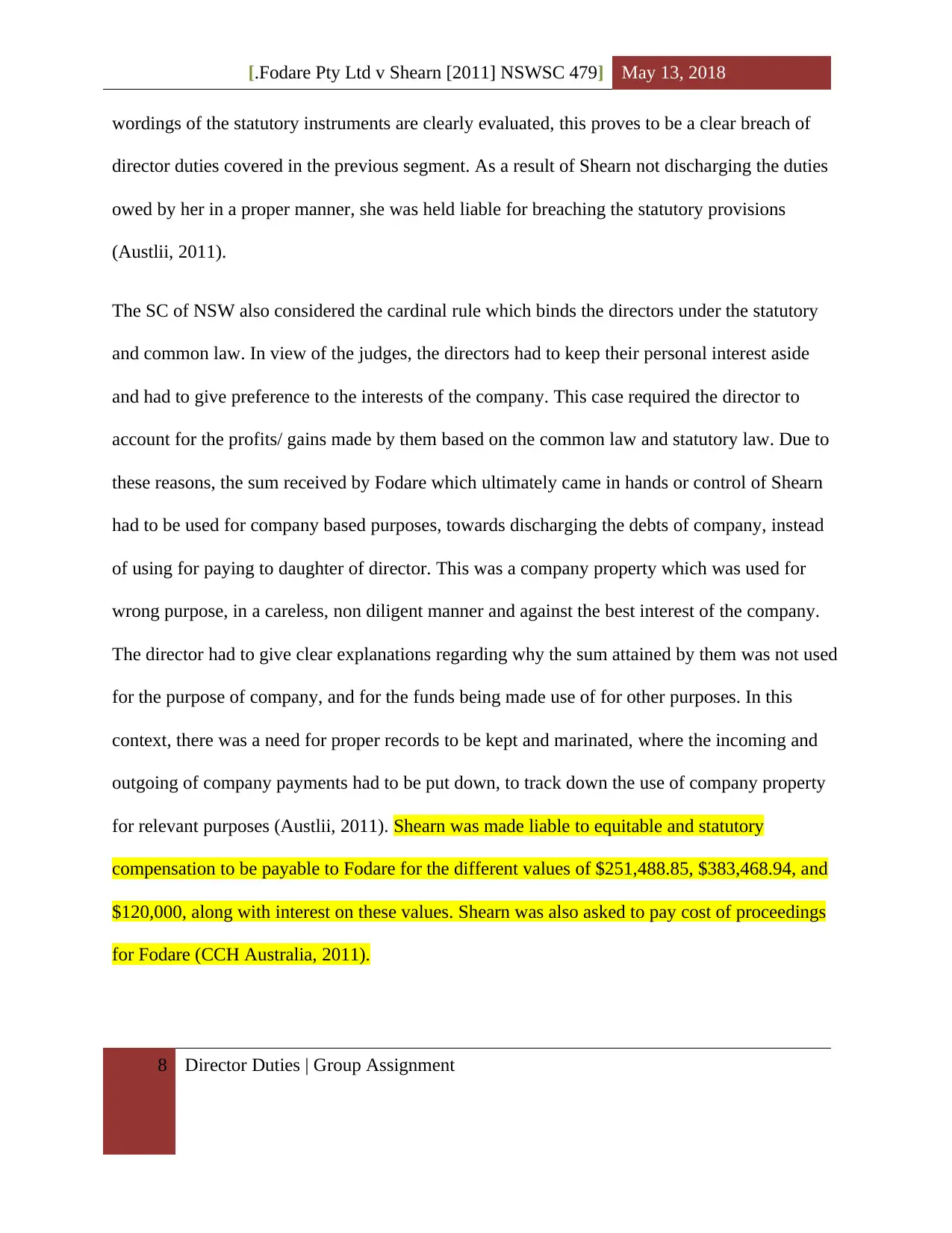
[.Fodare Pty Ltd v Shearn [2011] NSWSC 479] May 13, 2018
wordings of the statutory instruments are clearly evaluated, this proves to be a clear breach of
director duties covered in the previous segment. As a result of Shearn not discharging the duties
owed by her in a proper manner, she was held liable for breaching the statutory provisions
(Austlii, 2011).
The SC of NSW also considered the cardinal rule which binds the directors under the statutory
and common law. In view of the judges, the directors had to keep their personal interest aside
and had to give preference to the interests of the company. This case required the director to
account for the profits/ gains made by them based on the common law and statutory law. Due to
these reasons, the sum received by Fodare which ultimately came in hands or control of Shearn
had to be used for company based purposes, towards discharging the debts of company, instead
of using for paying to daughter of director. This was a company property which was used for
wrong purpose, in a careless, non diligent manner and against the best interest of the company.
The director had to give clear explanations regarding why the sum attained by them was not used
for the purpose of company, and for the funds being made use of for other purposes. In this
context, there was a need for proper records to be kept and marinated, where the incoming and
outgoing of company payments had to be put down, to track down the use of company property
for relevant purposes (Austlii, 2011). Shearn was made liable to equitable and statutory
compensation to be payable to Fodare for the different values of $251,488.85, $383,468.94, and
$120,000, along with interest on these values. Shearn was also asked to pay cost of proceedings
for Fodare (CCH Australia, 2011).
8 Director Duties | Group Assignment
wordings of the statutory instruments are clearly evaluated, this proves to be a clear breach of
director duties covered in the previous segment. As a result of Shearn not discharging the duties
owed by her in a proper manner, she was held liable for breaching the statutory provisions
(Austlii, 2011).
The SC of NSW also considered the cardinal rule which binds the directors under the statutory
and common law. In view of the judges, the directors had to keep their personal interest aside
and had to give preference to the interests of the company. This case required the director to
account for the profits/ gains made by them based on the common law and statutory law. Due to
these reasons, the sum received by Fodare which ultimately came in hands or control of Shearn
had to be used for company based purposes, towards discharging the debts of company, instead
of using for paying to daughter of director. This was a company property which was used for
wrong purpose, in a careless, non diligent manner and against the best interest of the company.
The director had to give clear explanations regarding why the sum attained by them was not used
for the purpose of company, and for the funds being made use of for other purposes. In this
context, there was a need for proper records to be kept and marinated, where the incoming and
outgoing of company payments had to be put down, to track down the use of company property
for relevant purposes (Austlii, 2011). Shearn was made liable to equitable and statutory
compensation to be payable to Fodare for the different values of $251,488.85, $383,468.94, and
$120,000, along with interest on these values. Shearn was also asked to pay cost of proceedings
for Fodare (CCH Australia, 2011).
8 Director Duties | Group Assignment
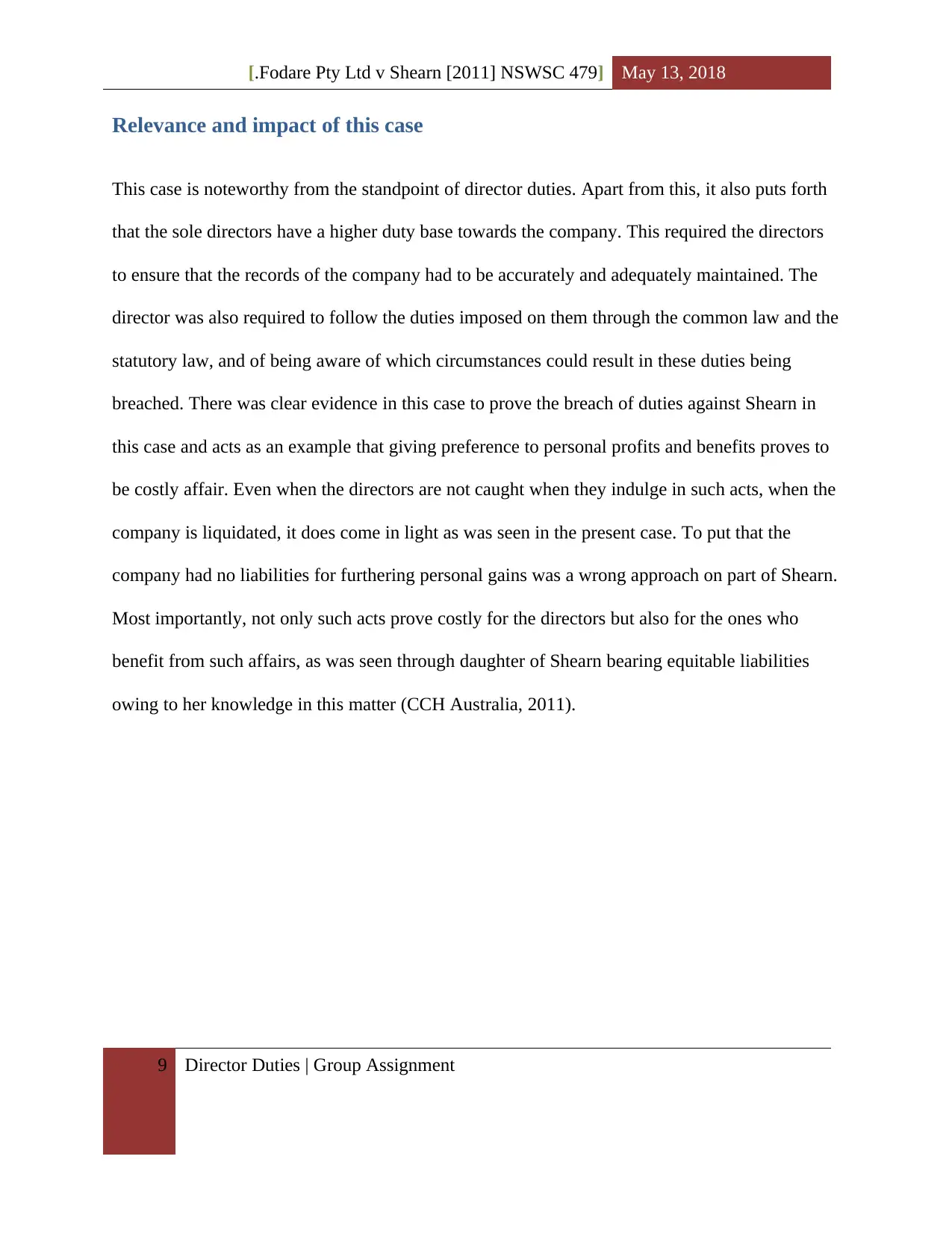
[.Fodare Pty Ltd v Shearn [2011] NSWSC 479] May 13, 2018
Relevance and impact of this case
This case is noteworthy from the standpoint of director duties. Apart from this, it also puts forth
that the sole directors have a higher duty base towards the company. This required the directors
to ensure that the records of the company had to be accurately and adequately maintained. The
director was also required to follow the duties imposed on them through the common law and the
statutory law, and of being aware of which circumstances could result in these duties being
breached. There was clear evidence in this case to prove the breach of duties against Shearn in
this case and acts as an example that giving preference to personal profits and benefits proves to
be costly affair. Even when the directors are not caught when they indulge in such acts, when the
company is liquidated, it does come in light as was seen in the present case. To put that the
company had no liabilities for furthering personal gains was a wrong approach on part of Shearn.
Most importantly, not only such acts prove costly for the directors but also for the ones who
benefit from such affairs, as was seen through daughter of Shearn bearing equitable liabilities
owing to her knowledge in this matter (CCH Australia, 2011).
9 Director Duties | Group Assignment
Relevance and impact of this case
This case is noteworthy from the standpoint of director duties. Apart from this, it also puts forth
that the sole directors have a higher duty base towards the company. This required the directors
to ensure that the records of the company had to be accurately and adequately maintained. The
director was also required to follow the duties imposed on them through the common law and the
statutory law, and of being aware of which circumstances could result in these duties being
breached. There was clear evidence in this case to prove the breach of duties against Shearn in
this case and acts as an example that giving preference to personal profits and benefits proves to
be costly affair. Even when the directors are not caught when they indulge in such acts, when the
company is liquidated, it does come in light as was seen in the present case. To put that the
company had no liabilities for furthering personal gains was a wrong approach on part of Shearn.
Most importantly, not only such acts prove costly for the directors but also for the ones who
benefit from such affairs, as was seen through daughter of Shearn bearing equitable liabilities
owing to her knowledge in this matter (CCH Australia, 2011).
9 Director Duties | Group Assignment
⊘ This is a preview!⊘
Do you want full access?
Subscribe today to unlock all pages.

Trusted by 1+ million students worldwide
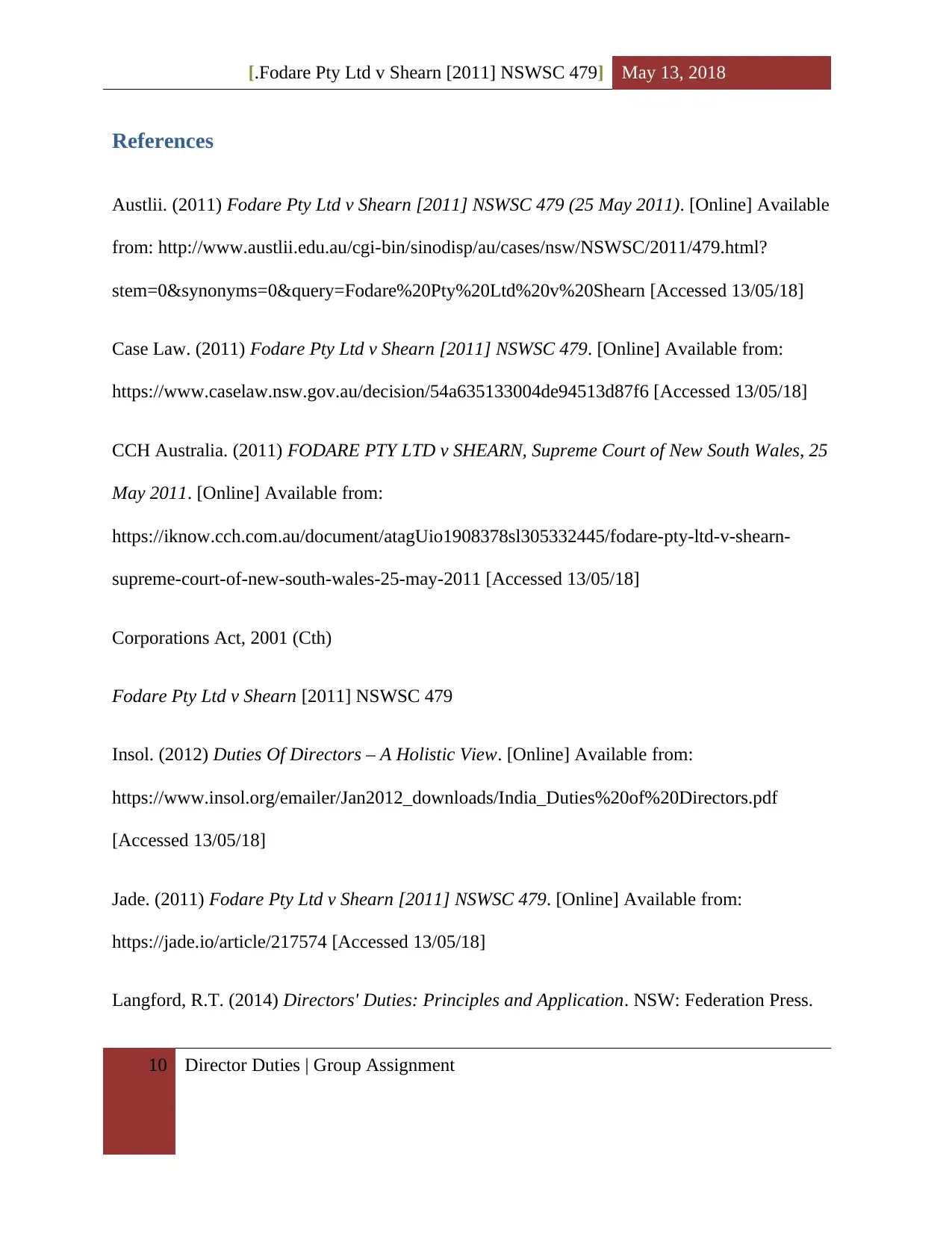
[.Fodare Pty Ltd v Shearn [2011] NSWSC 479] May 13, 2018
References
Austlii. (2011) Fodare Pty Ltd v Shearn [2011] NSWSC 479 (25 May 2011). [Online] Available
from: http://www.austlii.edu.au/cgi-bin/sinodisp/au/cases/nsw/NSWSC/2011/479.html?
stem=0&synonyms=0&query=Fodare%20Pty%20Ltd%20v%20Shearn [Accessed 13/05/18]
Case Law. (2011) Fodare Pty Ltd v Shearn [2011] NSWSC 479. [Online] Available from:
https://www.caselaw.nsw.gov.au/decision/54a635133004de94513d87f6 [Accessed 13/05/18]
CCH Australia. (2011) FODARE PTY LTD v SHEARN, Supreme Court of New South Wales, 25
May 2011. [Online] Available from:
https://iknow.cch.com.au/document/atagUio1908378sl305332445/fodare-pty-ltd-v-shearn-
supreme-court-of-new-south-wales-25-may-2011 [Accessed 13/05/18]
Corporations Act, 2001 (Cth)
Fodare Pty Ltd v Shearn [2011] NSWSC 479
Insol. (2012) Duties Of Directors – A Holistic View. [Online] Available from:
https://www.insol.org/emailer/Jan2012_downloads/India_Duties%20of%20Directors.pdf
[Accessed 13/05/18]
Jade. (2011) Fodare Pty Ltd v Shearn [2011] NSWSC 479. [Online] Available from:
https://jade.io/article/217574 [Accessed 13/05/18]
Langford, R.T. (2014) Directors' Duties: Principles and Application. NSW: Federation Press.
10 Director Duties | Group Assignment
References
Austlii. (2011) Fodare Pty Ltd v Shearn [2011] NSWSC 479 (25 May 2011). [Online] Available
from: http://www.austlii.edu.au/cgi-bin/sinodisp/au/cases/nsw/NSWSC/2011/479.html?
stem=0&synonyms=0&query=Fodare%20Pty%20Ltd%20v%20Shearn [Accessed 13/05/18]
Case Law. (2011) Fodare Pty Ltd v Shearn [2011] NSWSC 479. [Online] Available from:
https://www.caselaw.nsw.gov.au/decision/54a635133004de94513d87f6 [Accessed 13/05/18]
CCH Australia. (2011) FODARE PTY LTD v SHEARN, Supreme Court of New South Wales, 25
May 2011. [Online] Available from:
https://iknow.cch.com.au/document/atagUio1908378sl305332445/fodare-pty-ltd-v-shearn-
supreme-court-of-new-south-wales-25-may-2011 [Accessed 13/05/18]
Corporations Act, 2001 (Cth)
Fodare Pty Ltd v Shearn [2011] NSWSC 479
Insol. (2012) Duties Of Directors – A Holistic View. [Online] Available from:
https://www.insol.org/emailer/Jan2012_downloads/India_Duties%20of%20Directors.pdf
[Accessed 13/05/18]
Jade. (2011) Fodare Pty Ltd v Shearn [2011] NSWSC 479. [Online] Available from:
https://jade.io/article/217574 [Accessed 13/05/18]
Langford, R.T. (2014) Directors' Duties: Principles and Application. NSW: Federation Press.
10 Director Duties | Group Assignment
Paraphrase This Document
Need a fresh take? Get an instant paraphrase of this document with our AI Paraphraser
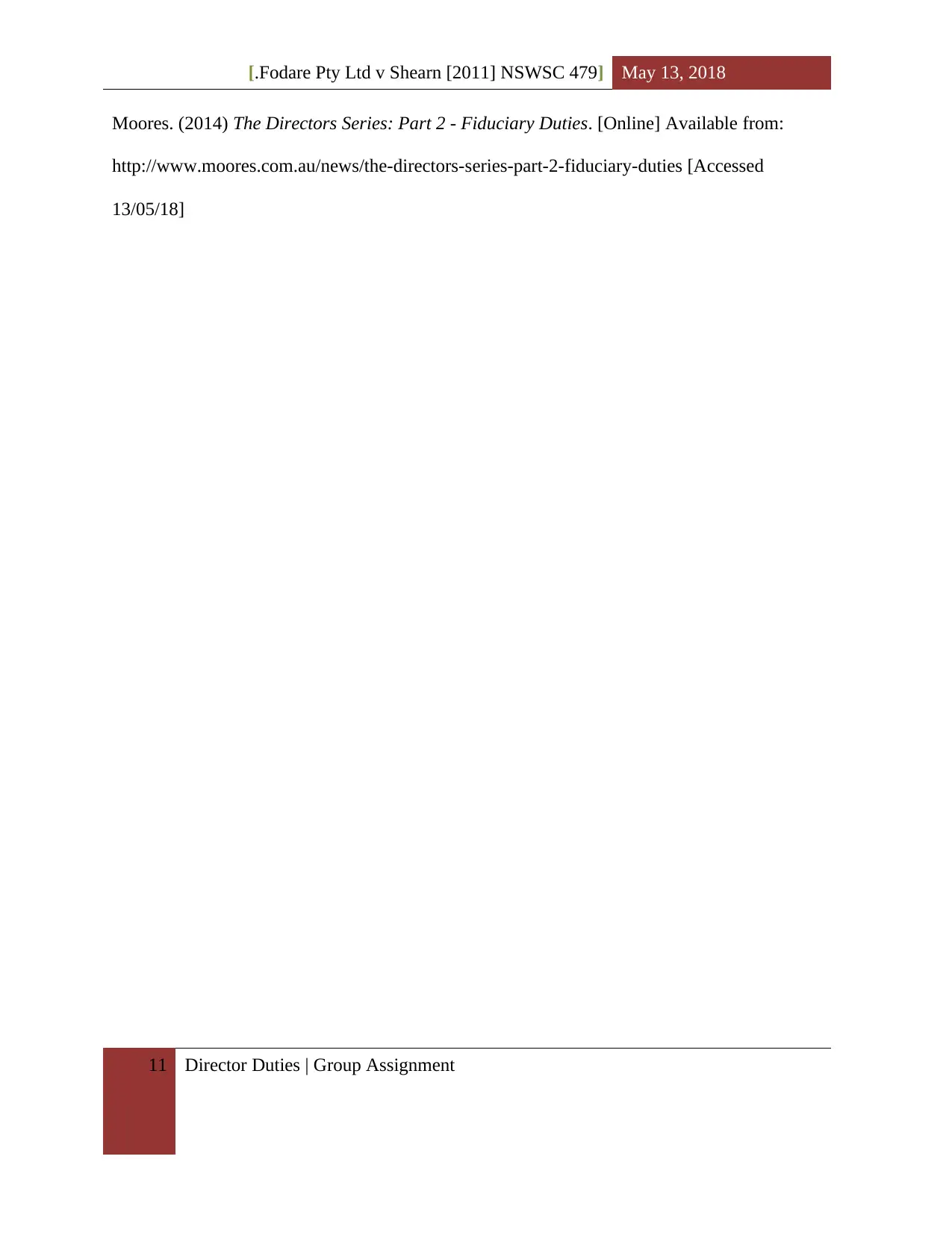
[.Fodare Pty Ltd v Shearn [2011] NSWSC 479] May 13, 2018
Moores. (2014) The Directors Series: Part 2 - Fiduciary Duties. [Online] Available from:
http://www.moores.com.au/news/the-directors-series-part-2-fiduciary-duties [Accessed
13/05/18]
11 Director Duties | Group Assignment
Moores. (2014) The Directors Series: Part 2 - Fiduciary Duties. [Online] Available from:
http://www.moores.com.au/news/the-directors-series-part-2-fiduciary-duties [Accessed
13/05/18]
11 Director Duties | Group Assignment
1 out of 11
Related Documents
Your All-in-One AI-Powered Toolkit for Academic Success.
+13062052269
info@desklib.com
Available 24*7 on WhatsApp / Email
![[object Object]](/_next/static/media/star-bottom.7253800d.svg)
Unlock your academic potential
Copyright © 2020–2026 A2Z Services. All Rights Reserved. Developed and managed by ZUCOL.
![Fodare Pty Ltd v Shearn [2011] NSWSC 479: Director Duties Case Study](/_next/image/?url=https%3A%2F%2Fdesklib.com%2Fmedia%2Fimages%2Fbz%2Fe5781427ac544a2fa81db59f3d03f924.jpg&w=256&q=75)


![Analysis of Fodare Pyt Ltd. V Shearn [2011] NSWSC 479 Case](/_next/image/?url=https%3A%2F%2Fdesklib.com%2Fmedia%2Fimages%2Fto%2Fc003c47972d54ac499b6fca5329d3bb6.jpg&w=256&q=75)
